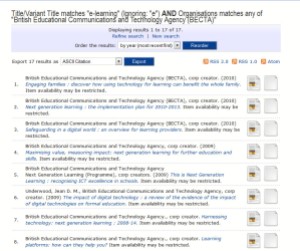This guest post was written by Nazlin Bhimani and Dan O’Connor of the Newsam Library and Archives, UCL Institute of Education. If this post sounds interesting, you can talk to Nazlin and Dan at History Day, as well as come listen to Dan talk about the Digital Education Resource Archive during the Digital Resources panel session.
On 20th January Dan O’Connor and I will be promoting the Newsam Library’s Special Collections and Archives at the Annual History Libraries and Research Open Day 2015. ‘Histories Day’ as it is now referred to, is a one-day conference for postgraduate students and early career researchers, which provides the opportunity for researchers to learn about historical collections in libraries and archives and for historians to meet the librarians in charge of these special collections. The full list of libraries participating and the programme for the day is here. The day is an open history fair with information and advice about using historical collections and getting practical research skills in finding primary source materials. The day will also include training on reference management and digital imaging.
In addition to the Library’s Special Collections, on this occasion, DERA, the Newsam Library’s Digital Education Resource Archive is to be showcased as an example of a digital archive that is home-grown and open access.
About DERA : Digital Education Resource Archive
DERA was created in 2010 by a team of librarians at the Newsam Library and Archives to preserve born-digital policy, guidance and research documents issued and funded by the UK government and quangos.
DERA’s History
The notion of a database was first mooted as a way of dealing with the increasing problem of ‘link rot’ in the Library Catalogue. Web links to many of the born-digital official government publications (including publications by independent bodies funded by the government to conduct research) took users to pages that no longer existed as new documents replaced older versions. As we know, web sites also have a habit of being refreshed and/or recreated and this is particularly true for each iteration of government body or quango. The result is that many older documents are retired and thus inaccessible or they are archived and given new web addresses. Keeping up with these changes became a labour-intensive process for the DERA team and although the Library maintained a print collection of key documents, automating the archiving process had to be considered to ensure long-term preservation to benefit researchers.
The team considered various options and decided to use the open source ePrints software (more commonly used to build research repositories) to create an archive of official publications on education and related content. Since the process of curating began, the team have added materials from organisations that are related to education, including independent pressure groups. Today DERA contains over 21,000 digital documents mainly born-digital materials relating to education and the related social sciences on this freely available open access database.
DERA’s Value
The DERA team’s efforts really paid off after the Coalition Government closed a number of departments and quangos as part of the austerity measures which meant that a lot of material was at risk of being permanently lost. One such organisation was BECTA, the British Educational Communications Agency that had been set up to promote technology in schools. Knowing that over 300 BECTA documents would be lost to future scholars, the DERA team approached BECTA in order to rescue this content. BECTA is only one example and many other departments approached the team to ensure preservation of their born-digital content.
Thus, what started as a way to preserve official publications has become a richer resource than was once envisaged. Scholars have found that rather than trawling through numerous websites to locate materials, the single access point via DERA provides open access, full-text content. DERA is now regarded as indispensable and the first port of call for researchers working on all aspects of education policy, history and the related social sciences. Here is more information on DERA and how it can be accessed.
Cross-posted with the blog at the the Newsam Library and Archives, UCL Institute of Education.

